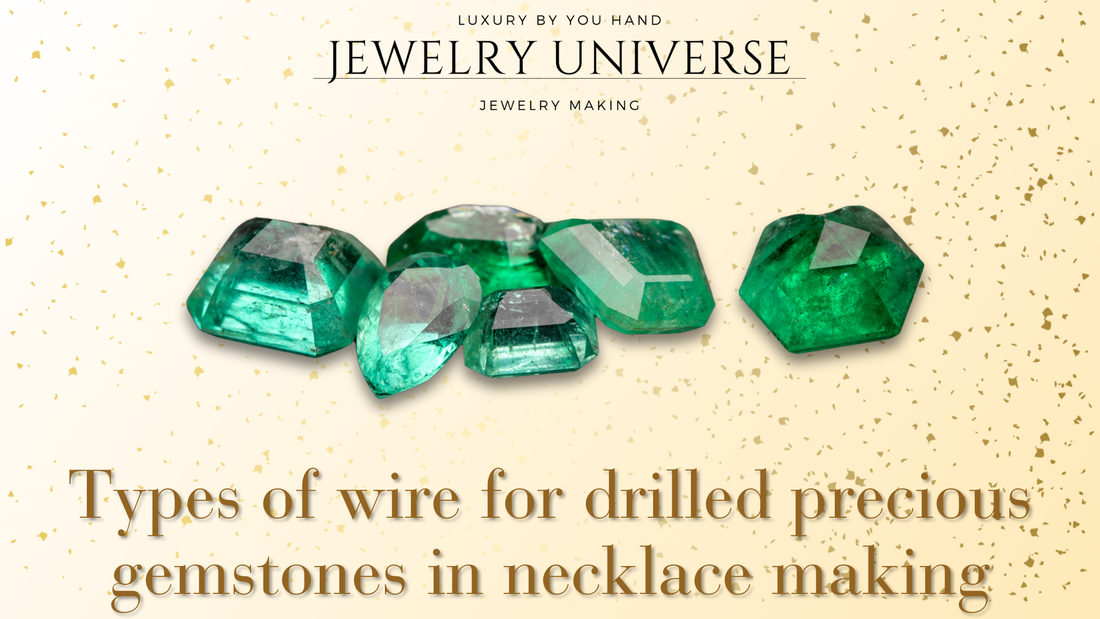
Types of wire for drilled precious gemstones in necklace making
Share
When creating a necklace with drilled precious gemstones, selecting the right wire is essential to ensure durability, aesthetics, and ease of assembly. The type of wire used affects not only the appearance but also the strength and flexibility of the final piece.
There are multiple wire types available, each with different properties, including metal composition, thickness (gauge), flexibility, and coating. Understanding these aspects will help you craft a high-quality gemstone necklace that is both elegant and long-lasting.
In this article, we will explore the various types of wire best suited for making necklaces with drilled precious gemstones, along with their advantages and specific uses.
Wire Materials for Drilled Gemstone Necklaces
Sterling Silver Wire: A Classic Choice
Sterling silver wire is a popular option for high-end jewelry due to its luxurious appearance, durability, and malleability.
-
Advantages:
- Provides an elegant, timeless look.
- Strong enough to hold heavy gemstones.
- Tarnish-resistant when properly cared for.
- Available in soft, half-hard, and hard tempers for different applications.
-
Best Uses:
- Perfect for delicate and elegant gemstone necklaces.
- Ideal for wire-wrapping techniques.
Gold-Filled Wire: Luxury Without the High Price
Gold-filled wire consists of a thick layer of gold bonded to a base metal (such as brass or copper). It offers the look of solid gold but at a more affordable price.
-
Advantages:
- More durable and resistant to tarnishing than gold-plated wire.
- Retains its shine and beauty for years.
- Suitable for fine jewelry and daily wear.
-
Best Uses:
- A great choice for high-end gemstone necklaces.
- Works well with delicate and colorful gemstones like sapphire, opal, and topaz.
Gold-Plated Wire: A Budget-Friendly Alternative
Gold-plated wire is a cost-effective option, featuring a thin layer of gold over a base metal. While it provides an attractive finish, it is less durable than gold-filled or solid gold wire.
-
Advantages:
- Affordable compared to gold-filled or solid gold.
- Available in different thicknesses and finishes.
- Suitable for occasional wear.
-
Best Uses:
- Best for fashion jewelry and lightweight gemstone necklaces.
- Not recommended for heavy gemstones, as the plating can wear off over time.
Copper Wire: A Versatile and Artistic Choice
Copper wire is often used in bohemian, rustic, or artistic jewelry designs. It is soft and easy to manipulate, making it a great choice for intricate wirework.
-
Advantages:
- Very flexible and easy to shape.
- Warm, earthy color that pairs well with turquoise, amber, and coral gemstones.
- Can be oxidized to create an antique or patina finish.
-
Best Uses:
- Suitable for handcrafted, vintage, or nature-inspired necklaces.
- Ideal for use in wire-wrapping designs.
Stainless Steel Wire: A Strong and Modern Option
Stainless steel wire is an excellent choice for durability and strength. It is highly resistant to tarnishing and corrosion, making it suitable for everyday wear.
-
Advantages:
- Extremely strong and durable.
- Hypoallergenic (great for people with metal allergies).
- Resistant to tarnish and rust.
-
Best Uses:
- Suitable for bold and modern gemstone necklaces.
- Ideal for designs requiring strong wire to hold heavier stones.
Nylon-Coated Beading Wire: Flexibility and Softness
Nylon-coated wire is often used in strung gemstone necklaces. It is soft, flexible, and reduces friction, preventing damage to delicate gemstones.
-
Advantages:
- Provides a smooth surface that prevents gemstone wear.
- Strong and flexible for multi-strand designs.
- Available in various thicknesses and colors.
-
Best Uses:
- Perfect for multi-strand gemstone necklaces.
- Works well for delicate stones that require extra protection.
Wire Gauge: Choosing the Right Thickness
Wire gauge refers to the thickness of the wire, and selecting the correct gauge is important for supporting your gemstones without compromising flexibility.
- 24-28 Gauge: Best for delicate, lightweight gemstones and intricate wire wrapping.
- 20-22 Gauge: Ideal for medium-weight gemstones and general necklace designs.
- 16-18 Gauge: Used for heavier gemstones or statement pieces requiring extra support.
Wire Temper: Soft vs. Half-Hard vs. Hard
The temper of the wire affects its workability and strength.
- Soft Wire: Very flexible and easy to bend. Ideal for coiling, wrapping, and intricate designs.
- Half-Hard Wire: Offers a balance of strength and flexibility, making it great for securing gemstones in place.
- Hard Wire: Strong and holds its shape well, but is more difficult to manipulate. Used for structural elements in jewelry making.
Best Wire for Different Necklace Styles
- For Simple Strung Gemstone Necklaces: Nylon-coated beading wire or thin stainless steel wire works best for durability and flexibility.
- For Wire-Wrapped Pendants: Soft or half-hard sterling silver, gold-filled, or copper wire provides a secure hold.
- For Heavy Gemstone Beads: 18-20 gauge half-hard wire (stainless steel or sterling silver) ensures durability.
- For Delicate Gemstones: 24-26 gauge soft wire helps prevent breakage.
Selecting the Best Wire for Your Gemstone Necklace
Choosing the right wire for drilled precious gemstones in necklace making depends on several factors, including material, thickness, flexibility, and durability.
- For fine jewelry, sterling silver and gold-filled wires are excellent choices for elegance and longevity.
- For artistic or budget-friendly designs, copper and gold-plated wires offer versatility.
- For strong, long-lasting pieces, stainless steel or nylon-coated wire ensures durability and resistance to wear.
By selecting the best wire for your gemstones, you can create stunning necklaces that are not only beautiful but also strong, durable, and professionally crafted.
